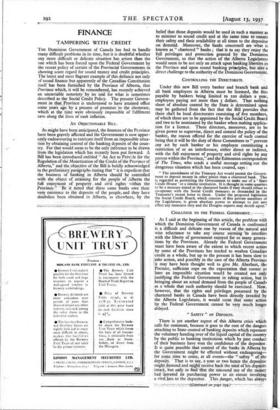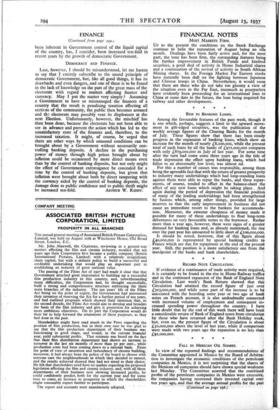FINANCE
TAMPERING WITH CREDIT
THE Dominion Government of Canada has had to handle many difficult problems in its time, but it is doubtful whether any more difficult or delicate situation has arisen than the one which has been forced upon the Federal Government by the recent policy of certain of the Provincial Governments in showing scant regard for sound money and credit principles. The latest and most flagrant example of this defiance not only of sound finance but apparently of the Canadian Constitution itself has been furnished by the Province of Alberta, that Province which, it will be remembered, has recently achieved an unenviable notoriety by its zeal for what is sometimes described as the Social Credit Policy. The present Govern- ment in that Province is understood to have attained office some years ago by a process of promises to the electorate, which at the time were obviously impossible of fulfilment save along the lines of rank inflation.
AN OBJECTIONABLE BILL.
As might have been anticipated, the finances of the Province have been gravely affected and the Government is now appar- ently endeavouring to extricate itself from an impossible situa- tion by obtaining control of the banking deposits of the coun- try. For that would seem to be the only inference to be drawn from the legislation which has recently been put forward. A Bill has been introduced. entitled " An Act to Provide for the Regulation of the Monetisation of the Credit of the Province of Alberta," and the,objective of the Bill is boldly acknowledged in the preliminary parigraphs stating that " it is expedient that the business of banking in Alberta should be controlled with the object of attaining for the people of Alberta the full enjoyment of property and civil rights - within the Province." Be it rioted that these same banks owe their very existence to the deposits of the people, and they have doubtless been obtained in Alberta, as elsewhere, by the belief that those deposits would be used in such a manner as to minister to sound credit and at the same time to ensure their safety and their availability at all times to the depositor on demand. Moreover, the banks concerns are what is known as " chartered " banks ; that is to say they enjoy the full privileges and protection granted by the Dominion Government, so that the action of the Alberta Legislature would seem to be not only an attack upon banking liberties in the Province and upon sound banking principles, but also a direct challenge to the authority of the Dominion Government.
CONTROLLING THE DIRECTORATE.
Under this new Bill every banker and branch bank and all bank employees in Alberta must be licensed, the fees payable by bankers being limited to too dollars a year, employees paying not more than 5 dollars. That nothing short of absolute control by the State is determined upon may be gathered from the fact that the Bill provides that there shall be local directorates consisting of five members, of which three are to be appointed by the Social Credit Board and two to be nominated by the banker when making applica- tion for a licence. These directors, moreover, are to be given power to supervise, direct and control the policy of the banker, the reason offered for the exercise of such control being that it will be the duty of these Committees to " prevent any act by such banker or his employee constituting a restriction of or an interference, either direct or indirect, with the full enjoyment of property and civil rights by any person within the Province," and the Edmonton correspondent of The Times, who sends a useful message setting out the dangerous situation which has been created, says :
" The amendment of the Treasury Act would permit the Govern- ment to deposit money in other places than a chartered bank. This is regarded as permitting the Government to make use of a ' State Credit House ' or a similar institution. It is thought in some quarters to be a measure aimed at the chartered banks if they should refuse to co-operate with the Social Credit measures as demanded in the Treasurer's recent letter to them. Under the proposed legislation the Social Credit Board, which consists of five private members of the Legislature, is given absolute power to attempt to put into effect any measures they and the Douglas experts may decide upon."
CHALLENGE TO THE FEDERAL GOVERNIENT. - - As I said at the beginning of this article, the problem with which the Dominion Government of Canada is confronted is a difficult and delicate one by reason of the natural and wise reluctance to take any course seeming to interfere with the liberty of government enjoyed for so many genera- tions by the Provinces. Already the Federal Government must have been aware of the extent to which recent action by some of the Provinces has tended to weaken Canadian credit as a whole, but up to the present it has been slow to take action, and possibly in the case of the Alberta Province it may have been thought well to give Mr. Aberhart, the Premier, sufficient rope on the expectation that sooner or later an impossible situation would be created not only justifying the Federal Government in taking action, but in bringing about an actual demand from the people of Canada as a whole that such authority should be exercised. Now, however, that the rights and privileges possessed by the chartered banks in Canada have been directly invaded by the Alberta Legislature, it would seem that some action by the Federal Government cannot be very much longer delayed.
" SAFETY " OF DEPOSITS.
There is yet another aspect of this Alberta crisis which calls for comment, because it goes to the root of the dangers attaching to State control of banking deposits which represent the voluntary handing over of the liquid capital of the country by the public to banking institutions which by past conduct of their business have won the confidence of the depositor. It is quite possible that control of the banks its Alberta by the Government might be effected without endangering— for some time to come, at all events—the " safety " of the deposits. That is to say, a -year or two hence the depositor might demand and might receive back the total of his deposits intact, but only to find that the unsound use of the money had lowered its purchasing power to an extent involving a vital loss to the depositor. This danger, which has alviays —(Cietaeirtae2.1 or: Page 294:,
FINANCE (Continued from page z92.)
been inherent in Government control of the liquid capital of the country, has, I consider, been increased ten-fold in recent years by the growth of democratic Government.
DEMOCRACY AND FINANCE.
Lest, however, I should be misunderstood, let me hasten to say that I entirely subscribe to the sound principle of democratic Government, but, like all good things, it has its drawbacks and even dangers, and one of these is to be found in the lack of knowledge on the part of the great mass of the electorate with regard to matters affecting finance and currency. May I put the matter very simply ? Assuming a Government to have so mismanaged the finances of a country that the result is penalising taxation affecting all secticns of the community, the public then becomes aroused and the electorate may possibly vent its displeasure at the next Election. Unfortunately, however, the mischief has then been done, because the electorate has not been able to see in advance and prevent the action which has led to the unsatisfactory state of the finances and, therefore, to the increased taxation. It might, of course, be urged that there are other ways by which unsound conditions can be brought about by a Government without necessarily con- trolling banking deposits. A decline in the purchasing power of money through high prices brought about by inflation could be occasioned by more direct means even than by the control of banking deposits, but not only might the effect of Government extravagance be concealed for a time by the control of banking deposits, but given that inflation were brought about both by direct tampering with the currency aided by the control of banking deposits, the damage done to public confidence and to public thrift might







































 Previous page
Previous page